Distinguished Critique: Wonder Woman by George Perez (vol. 1) Review
Perez's post-Crisis introduction to Wonder Woman is a resonant blend of myth and modernity which remains highly readable today
—by Nathan on January 23, 2024—
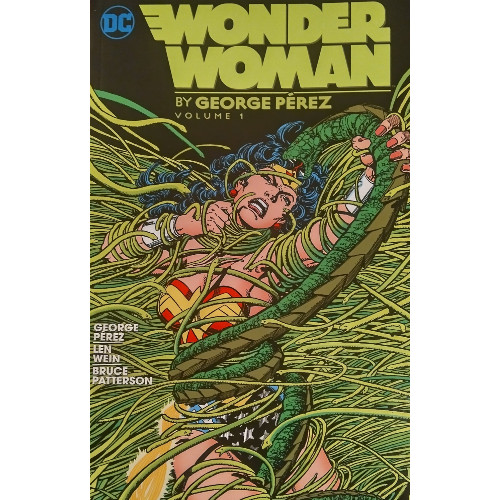
In my relatively recent examinations of DC relaunches in the wake of Crisis on Infinite Earths, one primary character has been startling absent thus far: Princess Diana of Themyscira, daughter of Hippolyte, the legendary Amazon warrior known to humanity as "Wonder Woman." I can't tell you precisely why I haven't discussed her mid-80s update until now. I tried reading a digital copy of the volume I'm reviewing a little over a year ago and just…didn't like it? I don't think I got past the first issue. It could also be that, where Superman's origin was updated in a limited series, Batman was modernized in a four-part narrative, and Green Arrow and Hawkman were each reintroduced to the post-Crisis landscape via three-part miniseries, Wonder Woman's new origins felt less contained. What began as a six-month stint for George Perez transformed into a five-year run, and I think that may have intimidated me. I, generally, like reading stories with a concrete ending, or at least with a decent wrap up, and when I began reviewing for Hubpages, I figured grabbing a small portion of a five-year run felt too incomplete…that's my theory, anyway. Yeah, the incompleteness of only analyzing the first few issues of a series hasn't stopped me with other narratives, but in exploring these very specific updated origins, I guess a few issues leading into a longer run just didn't appeal to me.
Whatever my reasons, times have changed. I've launched myself into stories with no definitive endings, and I've picked up several DC stories from the 80s for less popular heroes than Wonder Woman. If I'm gonna review the relaunched versions of Green Arrow, Flash (where I analyzed a handful of issues within a larger series, just like here), Hawkman, or even Aquaman, for crying out loud, I should at least consider discussing the third member of DC's famed trinity.
So, much later than I should have, I took a stroll through the gardens of the gods, casting my mind back to the days when Greek deities and monsters roamed the earth to see how Perez brought a then-modern spin to the powerful princess of Paradise Island.
Wonder Woman by George Perez (vol. 1)
Writers: George Perez, Len Wein, George Potter
Penciler: George Perez
Inkers: Bruce Patterson, Bob Smith, George Perez
Colorists: Tatjana Wood, Carl Gafford
Letterers: John Costanza, L.S. Macintosh
Issues: Wonder Woman #1-14
Publication Dates: February 1987-March 1988
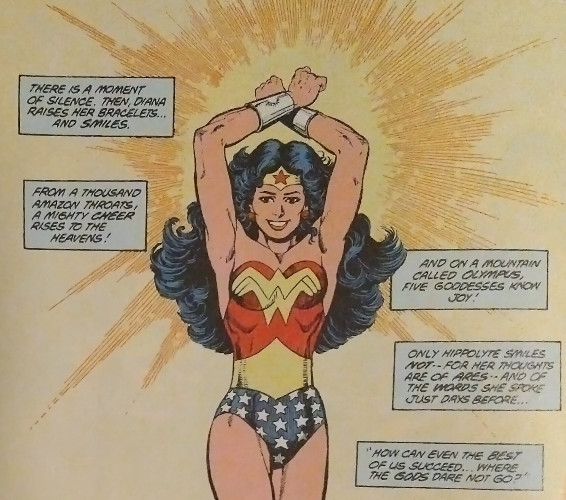
When I was a kid, I loved Rick Riordan's Percy Jackson novels. I devoured them. Riordan's humorous style, combined with sympathetic characters winding through a modern world inhabited by deities and demons made for compelling, imaginative reading. I was transfixed by how effectively Riordan modernized centuries-old characters and stories, drawing ancient mythology into America. Opening Perez's Wonder Woman, I quickly began feeling nostalgic for those novels: here was something similar…yet engagingly different.
Perez's work is not so much a modernization of myth: his Greek gods hang out on Mount Olympus, his monsters retain their original forms, his primary protagonist is a woman unfamiliar with "man's world." The world of myth and the world of reality are, largely, disconnected when we open the volume. They soon become intertwined, but not in the way Riordan brought the two together. Imagine a Zeus who hasn't changed in over a millennium or adapted to American culture; imagine an island of eternally young women who choose to keep the outside world…well, outside.
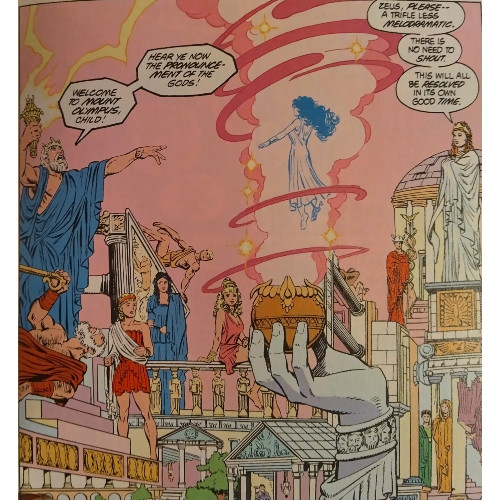
This isn't just a story about a hero who suffers a childhood tragedy or receives powers from a scientific accident and throws on a cape to "defend the world." This is a story about Diana and her first journey into the world of men, and through her perspective and experience, we too are treated to a dynamically different view of the world. Through other comics, we come to view the familiar through an extraordinary lens: Superman's a man, but he can fly. Wally West is a young man with some of the same problems we have…except I bet you never had to deal with gorging yourself on food because of your increased metabolism due to superhuman speed. The common and typical are taken and twisted, just a little. But Diana is stepping down from the fantastical into the mundane. She's more akin to Thor, used to a world of the supernatural, disconnected from our reality. The fun of these issues is watching how she navigates humanity and how her lens contributes to Perez and Co.'s discussions on the state of the world.
We enter a world on the brink. Nuclear Armageddon seems inevitable. A story that may seem trite or overused to various readers receives new sight through Diana's experiences. All of a sudden, a narrative which may falter under the weight of a ponderous protagonist bemoaning the state of the world receives some more credibility. We identify Diana as "alien," not like her compatriot Clark Kent, but as someone from a different culture and lifestyle. Her ways are not our ways, and by watching how her philosophies and actions impact the people she interacts with, you do begin to look at the world askance. A god of war stands in for vicious politicians, generals, and tyrants, and if Perez can get you to believe Ares is misguided through his violence and war-mongering, you should be able to transpose those qualities onto his real world counterparts easily enough. Diana feels betrayed by a publicist promising to represent her yet hoping for the prestige which comes with promoting a superhero, and again, you should interpret Perez's messages about media and power without too much difficulty.
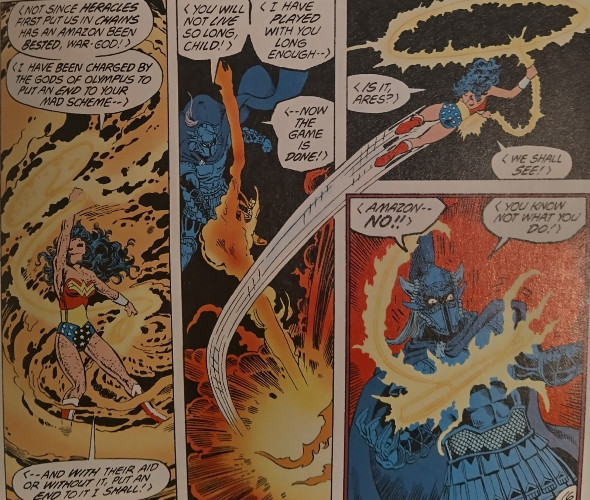
Perez achieves all this without being heavy-handed–he thankfully avoids the nationalistic notes found in Byrne's Man of Steel series and Mark Millar's Ultimates. Wonder Woman is a much more compassionate individual, and though her origin has some mysterious tethers to American symbology–leading to, I'll briefly mention, a genuinely fantastic turn near the volume's end which re-contextualizes her origin and strengthens her connection to another core character–Diana's message is more universal. She's kind, willing to pitch in, willing to save any life she can, even as she struggles to learn English and acquaint herself with the modern world. Wonder Woman is an outsider who helps the insider see where they've been blinded.
Levels of conflict are woven in well through this volume, whether it's animosity between the gods and the Amazons, Wonder Woman and the US Army's struggle against Ares, or even Hippolyte’s history with Hercules. And all of this conflict comes back to the same message of power: how it's used, when it's abused, and who can stand in and turn the tables on the abusers. An arrogant publicist tricking Diana in the name of fame and fortune is just as guilty as the gods of abusing the might which comes with their positions, just as a scientist-turned-cheetah-woman is guilty of displaying her newfound animalistic ferocity against Diana as a show of dominance. Find whatever allegorical elements you desire, interpret them as you wish, but the theme is prevalent. The theming fortunately subtle, which makes it much easier for a reviewer such as myself to see the strands connecting such plot points together or sniff out what I believe are the threads tethering this theme of power and abuse to the series' central characters.
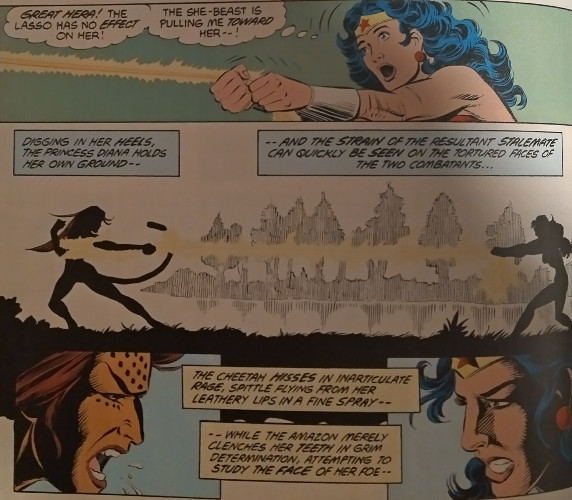
Perez maintains the fantastic artistic styling he utilized for Crisis, often breaking pages into a series of small panels which overlap purposefully. This isn't the cut-and-dried, nine-panel method found in Watchmen; Perez's style allows the artist more maneuverability, his panels laid out in unique yet practical sequence, using as much space as necessary to weave his stories. Panels often build in sequence, either honing in on some previously unknown detail or pulling out to get a larger perspective of a character. Colorful creatures, monsters, and demons are juxtaposed against modern settings, allowing the mystical and the majestic to contrast gray cities of steel.
Nicely, Perez works around the potential constraints imposed by two crossover events, Legends and Millennium. He devotes part of a single issue to Legends, altering the series' format to represent diary entries and letters written by supporting characters. His references to the machinations of Glorious Godfrey are sparse and, in this way, welcome. The limited amount of time dedicated to discussing the event keeps the plot moving forward, even if the epistolary nature of the issue makes for slow reading. His Millennium tie-in works particularly well–Diana is, temporarily, diverted from a current quest by the crossover's events, which is slightly awkward to read, but once our hero gets back on track, Perez uses the crossover to Diana's advantage. He weaves in a compelling plot point that creates an engaging mystery driving Diana forward for a while, even befuddling the gods for a time. Unfortunately, the whole piece is resolved in the Millennium limited series, but Perez does the best he can and often succeeds in blending his story with whatever mandates drove the larger crossovers.
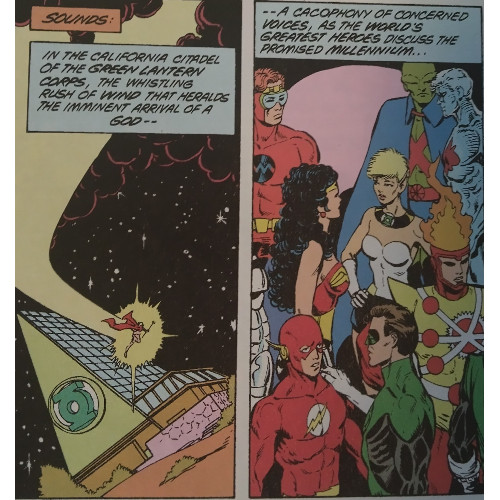
This is a strong start to Perez's five-year run. He deftly grounds Wonder Woman in a real world setting, with resonant real world themes, while never forgetting her mythological roots. He draws Diana into a conflicted world, and through her eyes and experiences, we see a real need for change. There's an imbalance of power threaded through these issues; it's a theme which could come across as preachy, heavy-handed. Diana's not some savior sent to root out all of the wickedness in the world while remaining untouched. She's a warrior who immerses herself in the danger and the panic, who fights despite her own trepidation and the fears of those around her. If you peer within the pages, you'll find the themes and the connections to our own existence. You don't even need a Lasso of Truth to force it out of the book. The volume speaks, and if you listen, you can create those parallels for yourself.